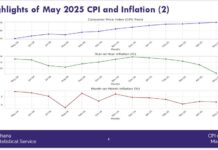Experts from the International Atomic Energy Agency (IAEA) are in town for an 8-day Integrated Regulatory Review Services (IRRS) mission.
The mission aims to evaluate Ghana’s regulatory infrastructure for nuclear and radiation safety, ensuring alignment with IAEA safety standards and international best practices.
Applying IAEA safety standards and international good practices, IRRS Missions are designed to strengthen the effectiveness of a member state’s regulatory infrastructure for nuclear and radiation safety.
As such, the mission seeks to assess how the Nuclear Regulatory Authority is ensuring the protection of people and the environment from the harmful effects of radiation hazards, intending to reach a higher level of public confidence and trust in the Authority.
It will also assess the country’s readiness as it advances its Nuclear Power Programme, which aims to incorporate nuclear energy into the national grid by the mid-2030s.
Key focus areas include emergency preparedness, occupational and public exposure control, nuclear security, stakeholder engagement, and regulatory procedures for facilities using nuclear material and radiation sources.
The IRRS team comprises 12 senior regulatory experts from Burkina Faso, Morrocco, Zimbabwe, South Africa, Malta, France, Turkiye, Netherlands, Latvia, Portugal, Hungary and Denmark and five IAEA staff.
This first Integrated Regulatory Review Services (IRRS) Mission was requested by the Government of Ghana in June 2022 and is being hosted by the Nuclear Regulatory Authority (NRA), the nation’s regulatory authority for nuclear and radiation safety, this year.
Sustainable energy
In a remark, Minister for Energy, Herbert Krapa emphasised the significance of the mission describing it as critical for Ghana’s ambitions to integrate nuclear power into its energy mix.
He highlighted the government’s plans to transition towards cleaner and more sustainable energy, underscoring the complementary role of nuclear power to renewable energy sources.
“Nuclear energy will play a pivotal role in Ghana’s energy transition, contributing to energy security, economic growth, and environmental sustainability,” he stated in a speech read on his behalf.
He also revealed that Ghana is considering both Small Modular Reactors (SMRs) and large-scale nuclear power plants, with a vendor selection announcement expected by the end of the year.
“This mission is more than just a review—a partnership. The insights from this mission will ensure Ghana’s regulatory systems are well-prepared for nuclear energy development,” he stated.
Insights
Ing. Dr. Nii Kwashie Allotey, Director-General of the NRA, elaborated on the mission’s scope reiterating that “This mission assesses how our regulatory infrastructure aligns with IAEA safety standards, focusing on actionable items such as application reviews, inspections, enforcement, and management systems. It also evaluates our preparedness for nuclear power,” he noted.
Dr. Allotey emphasised the mission’s role in identifying gaps and guiding improvements for long-term regulatory excellence.
Chief Director at the Ministry of Environment, Science, Technology, and Innovation (MESTI), Patrick Nomo, highlighted the mission’s importance in ensuring that Ghana’s policies, laws, and regulations meet international standards.
“This review comes at a time when Ghana has developed nuclear policies awaiting approval. The recommendations will enhance these policies before their implementation,” he explained.
Robert Bright Mawuko Sogbadji, Deputy Director of Power (Nuclear and Alternative Energy) at the Ministry of Energy, described the mission as timely.
He stated, “The NRA’s readiness to regulate nuclear technology is critical as we finalise the vendor selection process for Ghana’s first nuclear power plant. The regulations developed will ensure nuclear safety and security during deployment.”










